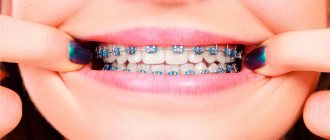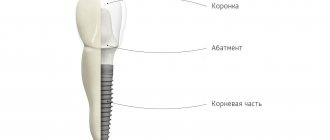May 15, 2020
If the lower or upper jaw becomes numb, this may be a natural reaction of the body, for example, to medical intervention, or it may indicate various problems that require immediate medical attention. In today's article by the editors of the UltraSmile.ru portal, we propose to analyze in detail the main reasons why numbness and discomfort occurs in the lower part of the face.
There can be several reasons for jaw numbness
Inflammatory process on the root of the tooth
If you are wondering why the lower jaw is numb, then the first thing you need to pay attention to is the condition of the oral cavity. An unpleasant symptom can be caused by dental diseases such as periodontitis and a cyst on the root of the tooth. Then, in addition to discomfort, a slight tingling sensation may be observed in the jaw and chin area, as well as pain when pressing or chewing food on the causative tooth.
The photo shows a cyst
Surgical intervention
Some patients report that their upper or lower jaw goes numb after undergoing the following dental procedures:
- tooth extraction: most often, an unpleasant symptom occurs after a complex removal of third molars, accompanied by drilling of the roots, peeling of the soft gum tissue and suturing,
- vestibuloplasty,
- trimming the frenulum of the tongue,
- bone tissue augmentation surgery: sinus lift and bone grafting,
- implantation1: especially when a large number of teeth were restored at once,
- opening and removal of cysts, granulomas, abscesses.
This condition can occur after surgery.
Why does the jaw go numb in the above cases? This may be a normal reaction of the body to nervous and physical stress, surgery, tissue injury and capillary damage. Most often, the symptom is associated with compression (squeezing) of nerve endings due to the formation of physiological edema that occurs after surgical procedures. Normally, the numbness should go away within a week after the intervention, but if it persists longer, it may indicate other problems. Read on!
Stages of damage to the mandibular nerve process during implantation
Dentists use a certain classification of injuries to the maxillary branches of the trigeminal nerve. The following stages of paresthesia are distinguished:
- Neuropraxia . Minor damage. At this stage, there is a slight loss of sensitivity and mild numbness, which goes away on its own after approximately 1-2 months.
- Axonotmesis . Despite the fact that the nerve at this stage, as well as at the previous stage, is partially damaged, this damage is more serious. This stage is characterized by the addition of pain. Unpleasant symptoms also go away on their own, but the recovery period is longer and lasts at least two months.
- Neurotmesis . The last stage, characterized by the most serious injury to the nerve process. At this stage, the damaged nerve tissue is replaced with scar tissue, which leads to a complete loss of sensitivity. These changes are irreversible, so restoration of sensitivity cannot be achieved even through surgery.
If jaw numbness continues for more than 5 hours after implant installation, do not delay your visit to the dental clinic. We should not forget that damaged nerve fibers are well restored only at the initial stage, and if you ignore visiting a doctor, the period of healing of the nerve tissue may be delayed, and the patient will require surgical intervention instead of physical therapy sessions to restore it.
How to get rid of numbness?
If a patient who has been feeling numbness in the chin for more than 5 hours after implantation immediately goes to the dental clinic, it will be enough for him to undergo a course of physical therapy supported by drug treatment. Such treatment at an early stage of the pathological process can effectively restore the sensitivity and conductivity of nerve fibers. Before proceeding to restorative physiotherapy procedures, a diagnostic study is carried out, during which the extent and nature of the damage are established. The therapeutic course itself is prescribed by a dentist, neurologist and physiotherapist.
It is worth noting that numbness that occurs after dental implantation may require long-term treatment, since the functional abilities and sensitivity of the facial muscles return gradually. However, timely use of physiotherapeutic techniques makes it possible to achieve a reduction in negative signs in the treatment of various neuropathies from the first sessions. To eliminate parasthesia caused by damage to the trigeminal nerve due to dental procedures, the following series of physiotherapy procedures are effectively used:
- Acupressure. Acupressure in problem areas.
- Acupuncture. Method of acupuncture influence on biologically active points.
- Ultraphonophoresis. Improving blood supply to tissues by exposing them to ultrasonic vibrations.
0%
Installment plan without overpayments
Start treatment today!
Take advantage of interest-free installments for 2 years without a down payment
Find out more
8
Payment by installments is possible without bank participation
In addition to the listed methods of physiotherapy, the patient may be recommended galvanic mud applications and electrophoresis. The speed of recovery, i.e. the return of full sensitivity to the facial muscles, is directly dependent on the patient’s compliance with all the recommendations of the attending physician.
Why is the risk of damage to the trigeminal nerve during implantation minimized at the Partner-Med clinic?
To avoid complications after implantation, for a complex procedure you should only contact trusted clinics that have a name and are popular with patients. In Moscow, one of such dentistry is the Partner-Med clinic. We employ only experienced, highly qualified specialists who can solve any, even the most complex dental problem. When contacting us to install implants, you don’t have to be afraid of any risks, because we:
- When planning an operation to install dental implants, we must calculate the exact model of their installation, taking into account the anatomical features of a particular patient.
- Partner-Med dentistry has a special operating room equipped with modern equipment.
- The operation plan is approved by the orthopedic dentist, chief physician of the clinic, Dmitry Nikolaevich Salatsky.
For patients of other clinics who do not understand why their numbness does not go away after dental implantation, we are also ready to help identify the cause and eliminate it. To get rid of the unpleasant feeling of numbness that reduces your standard of living, just sign up for a consultation at the Partner-Med clinic and get the problem diagnosed.
Just CALL US!
+7
We will answer any of your questions and will definitely help you!
Medical errors made during dental treatment
Dental treatment, and especially procedures that require surgery, are best done by professional doctors. Then the risk of developing any complications will be minimal. If a patient turns to an insufficiently experienced specialist, then there is always the possibility that not everything will go smoothly. For example, numbness of the lower jaw and chin can occur if the dentist damaged the nerve during the administration of anesthesia through a syringe or injured it during the operation. The cause of the pathology can also be incorrect calculation of the dosage of the anesthetic.
The numbing effect also occurs after improper treatment
Read the article on the topic “TOP 30 dental clinics.” In it you will find information about the best clinics in their segment.
The problem may arise after poor-quality treatment and filling of tooth canals. For example, if the doctor moved the filling material beyond the root. Or, during the treatment of deep caries and pulpitis, he left microbes inside the canals, which subsequently provoked root inflammation and periodontitis.
Inflammation and neuralgia of the trigeminal nerve
The branches of the trigeminal nerve cover almost the entire face, so it is quite natural that even after damage or inflammation of a limited area, discomfort can spread to the entire head, but most often it is the lower jaw that becomes numb.
Numbness of the lower jaw and chin due to inflammation or damage to the trigeminal nerve is often accompanied by other unpleasant symptoms: it is difficult to open the mouth, talk, chew and even swallow food, the sensitivity of the lips and tongue disappears, and uncontrolled salivation appears.
Unpleasant sensations are caused by inflammation of the ternary nerve
The cause of trigeminal neuralgia can be not only dental treatment2 and surgical intervention in the maxillofacial area. There are many other factors. Read about the most common of them, as well as about methods of treating pathology here.
Why does my chin go numb?
Trigeminal neuralgia
The main symptom of neuralgia is painful paroxysms provoked by shaving, tension of facial and masticatory muscles, contact with wind, cold water and air.
Involvement of the trigeminal nerve trunk is characterized by numbness of the entire half of the face, which develops during the chronic course of the pathology. Numbness of the chin is observed with an isolated lesion of the 3rd branch (n.mandibularis). Along with a decrease in sensitivity in the chin area, there is numbness in the lower part of the cheek, lower lip, lower jaw area, buccal mucosa, gums, teeth, lower half of the tongue and oral cavity. The clinical picture is complemented by peripheral paralysis of the masticatory muscles, accompanied by facial asymmetry. Possible deviation of the lower jaw in the direction of the lesion.
In 95% of cases, neuralgia develops as a result of nerve compression. The cause of compression may be a change in the diameter of the adjacent vessel in arterial hypertension and cerebral atherosclerosis. Another provoking factor is tumors of the brain and skull bones. Sometimes the disease is provoked by a narrowing of the bone canals due to chronic ENT diseases, traumatic brain injuries or dental pathologies.
Traumatic injuries
Numbness of the chin due to injuries is caused by a violation of the integrity or compression of the mandibular nerve. The symptom can be caused by damage to the soft tissues of the face in the projection of the small molars - in this place a branch of the nerve emerges from the canal of the lower jaw, providing sensitivity to the chin and lower lip. With bruises and hematomas, compression is usually observed; the symptoms quickly disappear after the swelling decreases.
With open wounds, the branch may be crossed with long-term numbness. When the lower jaw is fractured, compression or rupture of the n. alveolaris inferior, located in the intraosseous canal. The injury is accompanied by pain, swelling, hemorrhages in the skin and mucous membranes, articulation disorders, and facial asymmetry. Stepping of the dentition, mobility and dislocation of teeth may be detected.
Fractures of the lower jaw
Osteomyelitis of the lower jaw
The infectious-inflammatory process develops as a result of diseases of the teeth and gums, purulent wounds, open fractures, boils and carbuncles of the face, some ENT diseases, and the spread of infection from distant foci. Accompanied by pain, fever, discharge of purulent contents from the gum pockets, limited mouth opening, and breathing problems. Chin numbness may be accompanied by a tingling or crawling sensation.
Tumors of the lower jaw
The cause of numbness in the chin is cancer of the lower jaw. The occurrence of the symptom is often caused by nerve sprouting. The pathology is characterized by early onset of pain, rapid intensification of pain to unbearable, impaired closure and opening of teeth, infiltration of the cheeks and floor of the mouth, ulceration, and bleeding. Sometimes the symptom is provoked by some intraosseous or locally destructive benign neoplasia: ameloblastoma, osteoma, osteoblastoclastoma.
Diseases of the cervical spine
In some cases, numbness of the chin is caused by muscle tension and compression of the dorsal roots of the spinal cord against the background of spinal pathologies: osteochondrosis, protrusion, intervertebral hernia, spondyloarthrosis, etc. Pain and forced positioning of the head are observed. There may be numbness of the upper limb on the affected side.
Migraine with aura
One of the variants of aura during migraine is transient loss of sensitivity in the fingers with numbness spreading to the entire limb, half of the neck, face and chin. Subsequently, a typical clinical picture of migraine is formed with pressing or throbbing pain in half of the head, slight dizziness, nausea, and increased sensitivity to light and sound stimuli.
Shingles
The disease develops against the background of persistence of the herpes virus and is diagnosed in people who have had chickenpox in the past. Along with neuritis of the intercostal, facial and trigeminal nerves, skin rashes are observed along the listed nerve trunks. In children, catarrhal inflammation of the upper respiratory tract may be detected. Symptoms of shingles last for 2-3 weeks.
Other diseases
Sometimes numbness of the chin is determined by the following pathologies:
- Multiple sclerosis.
A characteristic feature of the disease is damage to the sensory pathways and individual cranial nerves, including the trigeminal nerve. Paresis, optic neuritis, ataxia, and dysfunction of the pelvic organs are observed. - Pernicious anemia.
Numbness of the chin is combined with sensitivity disorders in the face and limbs, muscle weakness, and changes in gait. Tachycardia, hepatosplenomegaly, and “varnished tongue” are detected. - Mental disorders
. The symptom most often occurs during hysteria. It is found in an unusual context that does not fit into the clinical picture of a certain somatic disease. In some cases, it is observed with depression.
Vitamin and mineral deficiency
If the upper or lower jaw, as well as the lips, tongue and chin, go numb, then the reasons for this phenomenon may lie in an acute lack of B vitamins. With their deficiency, the conduction of nerve impulses is disrupted. To replenish the body’s “pantry” with B vitamins, you need to include foods such as nuts, beans, chicken, cheeses and cereals in your diet.
“My lower jaw constantly went numb during pregnancy. I complained to the doctor, but she said that this happens often. Pregnant women have metabolic disorders and slow blood flow, and they are always lacking vitamins and minerals. To correct the situation, I took all sorts of vitamins as prescribed by the doctor, had a massage, and tried to eat right. BUT nothing helped. I already began to suspect some serious abnormalities in my health, I donated blood, but the tests were normal. Everything went away a few weeks after giving birth!”
Alina I., review from babyblog.ru
Lack of vitamins also contributes to jaw numbness
Serious diseases of the body
If the lower jaw is numb and the symptom either goes away or systematically appears again and again, then this may indicate cervical osteochondrosis. The problem arises due to poor circulation, compression of nerves and blood vessels in the cervical spine. In this case, the jaw, chin, lips become numb, and dizziness becomes a constant companion of the sick person.
Often, facial paresthesia (a sensitivity disorder characterized by tingling and numbness) occurs due to serious illnesses that require immediate medical attention. Let's list them:
- neuritis and neuroses,
- diabetes mellitus: an unpleasant symptom appears due to a decrease in blood glucose levels,
- hypertension,
- epilepsy,
- sinusitis and sinusitis: the upper jaw goes numb,
- meningitis,
- stroke and cerebrovascular accident,
- vegetative-vascular dystonia and anemia,
- oncology: the problem occurs due to compression of the spinal cord or brain by a tumor.
This symptom may be a consequence of a serious illness in the body.
Numbness of the face
Stroke
Diabetes
36461 March 16
IMPORTANT!
The information in this section cannot be used for self-diagnosis and self-treatment.
In case of pain or other exacerbation of the disease, diagnostic tests should be prescribed only by the attending physician. To make a diagnosis and properly prescribe treatment, you should contact your doctor. Numbness of the face: causes of occurrence, what diseases it occurs with, diagnosis and treatment methods.
Definition
Numbness of the face occurs when the sensitivity of skin and muscle receptors to various impulses is impaired. This symptom may develop gradually or appear suddenly. Loss of facial sensitivity is described as burning, tingling, sometimes pain, and in some cases as a complete absence of sensation. When the face is numb, the color of the skin over the affected area may change in the form of pallor or redness.
In severe cases, sensory impairment is accompanied by a decrease in the motor function of the facial muscles.
Types of facial numbness
Any external influence, be it heat or cold, light touch or strong pressure, leads to activation of skin receptors and muscle structures. Each receptor is associated with a specific type of nerve fiber that transmits a specific type of sensitivity (sensation of pressure on the skin, vibration, stretching of the skin, and temperature sensitivity). An impulse is generated in the receptor, which is sent through nerve fibers at high speed to the nerve ganglia, which are a collection of sensory neurons. This is where primary information processing occurs to activate vital reflexes. Subsequently, the impulse goes to the brain, where it is processed in special nerve centers, and the person feels pain, pressure, vibration, etc. Thus, we can talk about the following types of sensitivity disorders:
- Violation of surface sensitivity
occurs when receptors (temperature, tactile, pain, etc.) and nerve fibers of the facial skin are damaged. - Violation of deep sensitivity
occurs when the receptors and nerve fibers of the facial muscles are damaged. - Violation of complex types of sensitivity
. A similar type of disorder occurs when the cerebral cortex is damaged. There is no recognition of two different stimuli that simultaneously affect the skin, or the person cannot determine the location of the touch.
Possible causes of facial numbness
In many cases, numbness in different parts of the face is short-term, passing within a few minutes.
Such episodes can occur when the head is positioned in an awkward position, for example during sleep.
This occurs due to compression of the nerve fibers and a temporary disruption of impulse conduction. There is a burning and tingling sensation in the affected area. Partial loss of sensitivity is observed with prolonged exposure to the cold due to vasospasm. After gradual warming of the skin, sensitivity is restored.
However, facial numbness can be a symptom of a serious medical condition.
Acute cerebrovascular accident, or stroke
– a common cause of sudden numbness of the face in combination with a violation of facial activity. Hemorrhage or blockage of brain vessels by a thrombus (blood clot) occurs, acute oxygen deficiency and damage to neurons with disruption of their functions develops. Symptoms develop unexpectedly, sometimes accompanied by headache.
The main signs of a stroke are: numbness of the face and limbs on one or both sides, sudden weakness, speech impairment (inability to clearly pronounce words), drooping of the corner / corners of the mouth, uncoordination of movements.
If these symptoms appear, you should immediately seek medical help. A cerebral aneurysm
can cause numbness in the face due to compression of nerve fibers and sensitive centers of the brain. It usually develops gradually; at the onset of the disease, symptoms may be completely absent. Numbness first affects one area of the face (for example, perioral), and with further growth of the aneurysm, the affected area gradually expands. Sensations may also change: from tingling, burning at first - to a complete absence of sensations later.
There is a danger of rupture of a cerebral aneurysm; in this case, the symptoms are similar to those of a stroke and appear quickly.
Trigeminal neuritis
often accompanies inflammatory diseases of the oral cavity (caries, periodontitis), ear (otitis), paranasal sinuses (sinusitis, frontal sinusitis, ethmoiditis), parotid glands (mumps). The branches of the trigeminal nerve are irritated, which can lead to numbness in the corresponding areas of the face.
Impaired sensitivity with increased tone of the masticatory muscles
occurs due to compression of the branches of the trigeminal nerve by muscle fibers. Hypertonicity of the masticatory muscles is characteristic of damage to the temporomandibular joint due to arthritis and arthrosis, incorrectly selected braces, and certain diseases of the pharynx, for example, peritonsillar abscess.
Diabetes
– with this disease, the process of utilization of glucose from the blood is disrupted, which leads to damage to the vascular wall and disruption of the nutrition of nerve bundles. In the absence of maintenance therapy, tingling and partial loss of sensitivity in areas where the blood supply is impaired may occur.
Numbness of the face in multiple sclerosis
occurs due to demyelination (disappearance of the outer sheath) of the nerve fibers of the trigeminal nerve. Numbness is often preceded by severe pain not only in the face, but also in the limbs.
Tumors of the brain and its membranes
lead to impaired sensitivity in the facial area due to compression of the neurovascular bundles or tumor growth in them.
Which doctors should I contact if I have facial numbness?
If your face becomes numb, you should consult a neurologist or therapist. In some cases, consultation with an otolaryngologist, endocrinologist, or dentist may be required.
Diagnosis and examinations for facial numbness
Depending on the suspected cause of facial numbness, the following laboratory and instrumental studies may be required:
- clinical blood test;
Keeping the head and neck in an unnatural position for a long time
Impaired blood circulation and circulation, compression of nerve endings and, as a result, numbness of the jaws and other areas of the face, can be caused by spending a long time at the computer. Especially when a person props his cheek or chin with his hand. The problem often occurs in people who have an uncomfortable pillow or mattress, sleep in one position for a long time or stay in one position.
After being in an uncomfortable position for a long time, this symptom may occur.
Usually, an unpleasant symptom goes away almost immediately after eliminating the irritating factor or doing a little warm-up.
As you can see, there are many reasons why the upper and lower jaw become numb. Some of them are very dangerous. Therefore, if an unpleasant symptom accompanies you for a long time and appears frequently, then you should consult a doctor. It is best to start the examination with a dentist, but in the future you may need the help of a cardiologist, neurologist, endocrinologist, oncologist, psychotherapist and other specialists.
Notice
: Undefined variable: post_id in
/home/c/ch75405/public_html/wp-content/themes/UltraSmile/single-item.php
on line
45 Notice
: Undefined variable: full in
/home/c/ch75405/public_html/wp-content /themes/UltraSmile/single-item.php
on line
46
Rate this article:
( 4 ratings, average: 4.25 out of 5)
prevention
- Osmanova Z.Kh., Salikhova A.A. Possible postoperative complications when using dental implants // Bulletin of medical Internet conferences. – 2022.
- Marine M.T. [and others] Neuropathy of the trigeminal nerve after surgical interventions in the maxillofacial region // Nervous diseases. – 2022.
Consulting specialist
Orlova Elena Vladimirovna
Doctor rating: 9.5 out of 10 (2) Specialization: Dentist-therapist Experience: 33 years
Treatment
Conservative therapy
Treatment tactics depend on the causes of chin numbness. Patients with trigeminal neuralgia are prescribed anticonvulsants. The dosage is gradually increased until a therapeutic effect is achieved. Reception is continued for several months, and then the dose is gradually reduced. The regimen is supplemented with antihistamines, antispasmodics, and means to improve microcirculation. Blockades are performed according to indications. Among the effective physiotherapeutic techniques are diadynamic currents, galvanization, and ultraphonophoresis.
To relieve a migraine attack, NSAIDs are used; in severe cases, drugs from the triptan group are used. For repeated vomiting, antiemetics are used. To prevent paroxysms, long-term treatment with antidepressants and anticonvulsants is carried out. For herpes zoster, antiviral therapy is administered with acyclovir. Mental disorders are corrected with the help of psychotherapy, sometimes in combination with psychotropic drugs.
Antibiotics are indicated for wounds, open fractures, and osteomyelitis of the jaw. First, broad-spectrum antibacterial drugs are used, and later the medication is replaced taking into account the antibiotic sensitivity of the pathogen. Patients with pernicious anemia require lifelong treatment with B12 drugs, elimination of conditions that led to the development of vitamin deficiency.
Comments
And if not the whole jaw is numb, but only its left half, and everything that is there: part of the lip, part of the cheek, teeth. Sensitivity disappeared completely. What could it be?
Svetlana (05/19/2020 at 15:14) Reply to comment
- Dear Svetlana, there can be a lot of reasons, ranging from a pinched nerve, ending with a mini-stroke, multiple sclerosis. If you experience similar symptoms, you need to call an ambulance.
Editorial staff of the portal UltraSmile.ru (05.24.2020 at 09:18) Reply to comment










